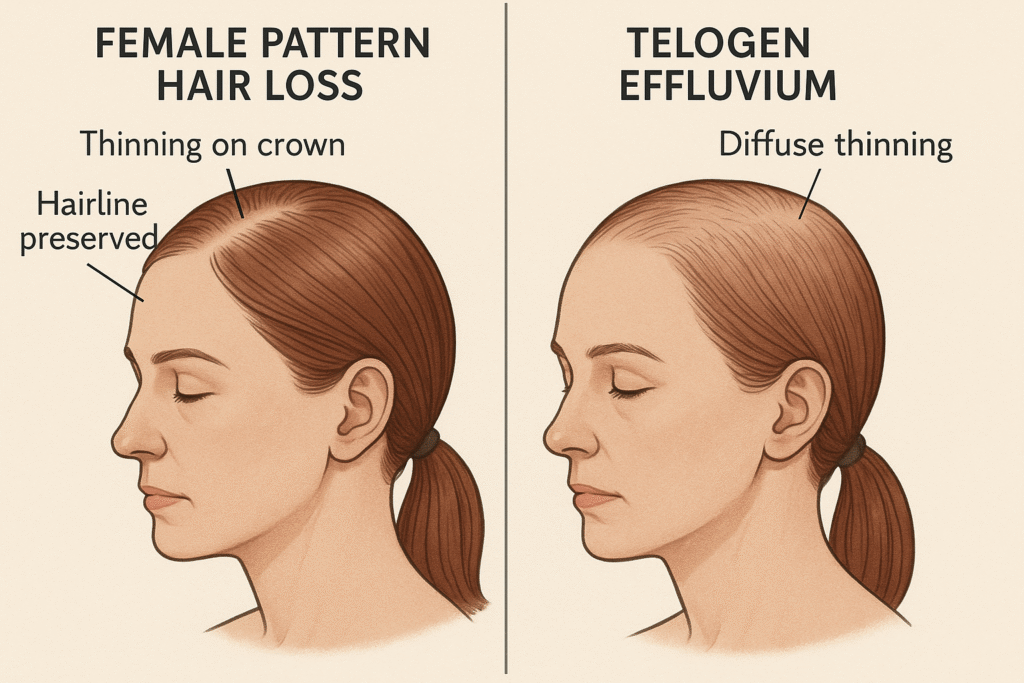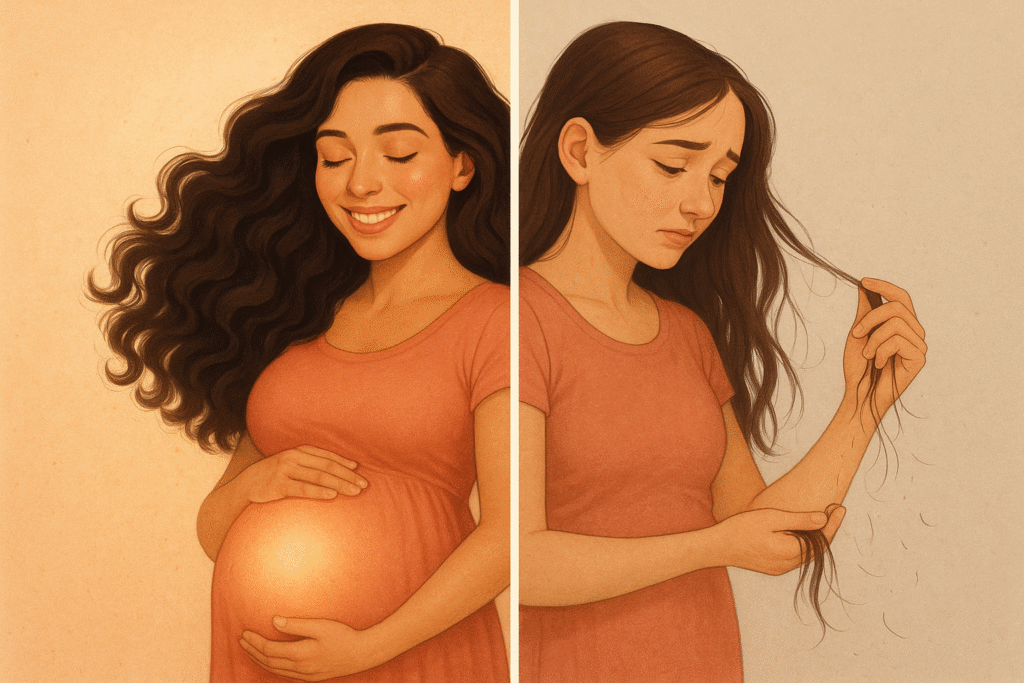Hair GP for Her
Our doctor-led team is committed to providing empathetic and expert care, tailored specifically to meet the needs of women.
Contact us >>Welcome to Hair GP for her
Welcome to Hair GP for Her, where we recognise that women’s hair loss requires a distinct and specialised approach. Hair loss in women can be emotionally distressing and often involves unique challenges that differ from those faced by men. At Hair GP, our doctor-led team is committed to providing empathetic and expert care, tailored specifically to meet the needs of women. We understand the profound impact hair loss can have on your self-esteem and overall well-being, and we are here to offer personalised solutions that not only address the physical aspects but also support you in regaining your confidence. Join us on a journey towards restoring your hair and revitalising your sense of self. As a women-founded and led business, we are deeply committed to understanding and championing the unique needs of women.
Achieving the best treatment for female hair loss is always possible through:
Correct Diagnosis
Doctor Led Consultations & Ongoing Follow Up
Bespoke / Customised Topical Formulas
Surgical / Non-Surgical Treatments
Female pattern hair loss
Female Pattern Hair Loss involves gradual thinning of hair on the top and crown of the scalp, often affecting self-esteem. At Hair GP for Her, we utilise the Ludwig Scale to classify the severity of hair loss, aiding in precise diagnosis and treatment planning. Early diagnosis is key, and under Dr. Amy’s expert guidance, we offer personalised treatment options to effectively manage this condition and restore your confidence.

The Ludwig scale is a key tool for classifying female pattern hair loss into three distinct stages, providing clarity in diagnosing hair thinning and planning effective treatments. Unlike the Norwood scale, which is male-focused, the Ludwig scale is tailored specifically for women.
Stage I is characterised by mild thinning of the hair, often noticeable at the crown, yet still easy to manage with early intervention.
Stage II involves noticeable thinning, with increased visibility of the scalp, requiring more comprehensive treatment strategies to preserve hair density.
Stage III represents severe thinning, where significant scalp exposure is evident, necessitating advanced therapeutic approaches to restore and maintain hair. This clear framework for understanding hair loss progression supports personalised treatment strategies, ensuring each woman’s needs are met with precision and care.
Menopause
As women transition through menopause, many experience noticeable changes in their hair health. This phase of life, marked by significant hormonal shifts, can lead to hair thinning and loss, affecting self-esteem and overall well-being. Understanding the intricate relationship between menopause and hair loss is crucial for managing these changes effectively. By acknowledging the impact of fluctuating hormone levels, we can better address hair loss concerns and tailor solutions that meet each individual’s needs. This section will delve into the distinctions between perimenopause and menopause, explore the necessary investigations to diagnose hair loss during this time, and outline effective treatment options to help you maintain healthy, vibrant hair.
Difference between Perimenopause and Menopause
Perimenopause and menopause are key phases in a woman’s life, each characterised by distinct hormonal changes that can impact hair health in different ways. Perimenopause is the transitional period leading up to menopause, often beginning in a woman’s 40s, though it can start earlier. During this stage, oestrogen levels fluctuate, which can lead to hair thinning and increased shedding. Menopause itself is marked by the cessation of menstrual cycles for 12 consecutive months, typically occurring around age 51. At this stage, the decline in oestrogen becomes more pronounced, often exacerbating issues of hair loss. Understanding these stages is essential for identifying how hormonal shifts specifically affect hair, allowing for targeted approaches to treatment.
Investigations for Hair Loss Around Menopause
When addressing hair loss during menopause, a comprehensive diagnostic approach is vital. It begins with a detailed medical history to understand the individual’s health background and any genetic predispositions. Hormone level tests are crucial as they provide insights into oestrogen, progesterone, and other hormone fluctuations that might be contributing to hair loss. Scalp examinations are conducted to assess the condition of hair follicles and identify any patterns of thinning or shedding. These investigations enable healthcare professionals to pinpoint the underlying causes of hair loss, paving the way for tailored interventions that address the specific needs of each patient.
How we investigate and identify the cause of your hair loss cause
Medical history
Scalp examination
Trichoscopy
Blood tests
Genetic tests
Treatment for Hair Loss Around Menopause
Managing hair loss during menopause requires a comprehensive approach encompassing lifestyle adjustments, topical treatments, and medical interventions. Lifestyle modifications, such as a balanced diet abundant in essential vitamins and minerals, regular exercise, and stress management techniques, are crucial for supporting overall hair health. Topical treatments, like minoxidil, can stimulate hair growth and enhance follicle vitality. Additionally, innovative therapies such as PRP (Platelet-Rich Plasma) and polynucleotide treatments have shown effectiveness in improving hair density and strength. In more persistent cases, hormone replacement therapy (HRT) may be considered to stabilise hormone levels, although this should be thoroughly evaluated with a healthcare provider. At Hair GP, we prioritise personalised care, ensuring each treatment plan is crafted to meet the unique needs and preferences of our patients, ultimately aiming to restore both hair health and confidence.
Hormone related hair loss
Hormonal imbalances play a significant role in hair health, often leading to hair loss that can impact women at various stages of life, including puberty, pregnancy, and menopause. These fluctuations in hormone levels can disrupt the natural hair growth cycle, resulting in thinning or shedding that can affect one’s self-esteem and well-being. Understanding the intricate relationship between hormones and hair loss is essential for effective management and treatment. By gaining insight into how specific hormonal conditions influence hair health, we can develop tailored strategies to mitigate their effects, ensuring that each woman receives the care and attention needed to maintain her confidence and vitality. This section will delve into the different hormonal conditions and their unique impact on hair, offering guidance on how to navigate these challenges.
What is PCOS and how it causes hair loss
Polycystic Ovary Syndrome (PCOS) is a complex endocrine disorder affecting 1 in 10 women, significantly impacting hormone levels and leading to a variety of symptoms, including hair loss. The condition often results in elevated levels of androgens, sometimes referred to as male hormones, which can contribute to thinning hair on the scalp and excess hair growth in other areas. Managing hair loss related to PCOS involves addressing the underlying hormonal imbalance, typically through lifestyle changes, such as diet and exercise, as well as medical treatments like hormonal therapy or anti-androgen medications. At Hair GP, we focus on providing comprehensive care tailored to each individual’s needs, helping women navigate the challenges of PCOS with confidence.
Telogen Effluvium
Telogen Effluvium is a temporary form of hair loss that can occur when a significant number of hair follicles enter the resting phase, known as the telogen phase, prematurely. This condition is often triggered by hormonal changes, stress, or illness, leading to noticeable hair shedding. While Telogen Effluvium can be distressing, it is usually reversible, with hair growth typically resuming once the underlying cause is addressed. Effective management strategies include stress reduction techniques, nutritional support, and, in some cases, topical treatments to stimulate hair regrowth. At Hair GP, we provide guidance and support to help individuals understand and manage Telogen Effluvium, aiming for a full recovery of hair health.
Post partum hair loss
Post-partum hair loss is a common phenomenon experienced by many women following childbirth, primarily due to the dramatic hormonal shifts that occur after delivery. During pregnancy, elevated hormone levels can prolong the growth phase of hair, resulting in thicker locks. However, once these levels drop post-partum, hairs that were previously in the growth phase can enter the shedding phase, leading to noticeable hair loss. This condition is typically temporary, and hair growth usually normalises within a few months. To manage post-partum hair loss, it is important to maintain a healthy diet, consider gentle hair care practices, and exercise patience as the body adjusts. At Hair GP, we offer empathetic care and advice to support new mothers through this transitional period, helping them maintain hair health and well-being.
Why choose us
At Hair GP for Her, we are proud to be a women-founded and led clinic, where our commitment to understanding and addressing women’s unique hair health needs is deeply personal. Our medical consultations are conducted by a female doctor, ensuring that our patients feel comfortable and understood in a supportive environment.

Dr. Amy, our lead specialist, brings a distinctive advantage with her dual expertise as both a General Practitioner (GP) and a hair restoration expert. This unique combination allows her to prescribe Hormone Replacement Therapy (HRT) directly, providing a seamless solution for those who need it as part of their hair restoration journey. Unlike many dermatologists or hair transplant surgeons who may refer you back to a GP, often leading to delays and inconvenience, Dr. Amy is equipped to handle all aspects of your care in one place.
At Hair GP, we deliver comprehensive, personalised care that saves you time and ensures you receive the most effective treatment without unnecessary steps. Trust us to be your partner in restoring your hair and your confidence.

Female Pattern Hair Loss is a common condition, primarily affecting the top and crown of the scalp with gradual thinning. It can impact a woman’s self-esteem, but early diagnosis and treatment can effectively manage the condition.
The Ludwig Scale helps classify the severity of hair loss in women, ranging from mild to extensive thinning. It guides our diagnosis and treatment planning to ensure a tailored approach for each patient.
We offer a range of personalised treatment options, including medication, lifestyle advice, and advanced therapies such as PRP, polynucleotides, topical medications, oral medications, and serums that are genetically personalised to you, along with essential vitamins. All treatments are guided by Dr. Amy’s expertise to address your specific needs.
Booking a consultation is simple. You can contact us directly through our website or call our clinic to schedule your appointment at a convenient time.
No referral is needed to see Dr. Amy. You can directly book an appointment without any prior referrals, making your journey to treatment straightforward.
During your first consultation, Dr. Amy will conduct a comprehensive assessment of your hair health, discuss your medical history, and design a personalised treatment plan tailored to your needs. Please see our blog guide for more information on what to expect.
You can begin to see results in a few months, but it typically takes 6-12 months for full results due to the hair cycle. Dr. Amy will provide a timeline during your consultation based on your specific treatment plan.
Unfortunately, our treatments are not currently covered by insurance, but we are actively working on this.
Hair GP for Her is a women-founded and led clinic, offering a unique blend of medical expertise and a personalised approach. Unlike many clinics, we provide comprehensive care under one roof, including HRT prescriptions without referrals to other practitioners.
Yes, Dr. Amy is qualified to prescribe Hormone Replacement Therapy directly, ensuring a seamless and efficient treatment process tailored to your needs.
Learn More about
Female Hair Loss
start Your Journey with us
If you wish to set up a consultation, click below button to enter our online booking system.
Book onlineIf you have a question, submit the form and our team will be in touch soon.
Prefer a phone call? Please call us on 020 8044 2081






